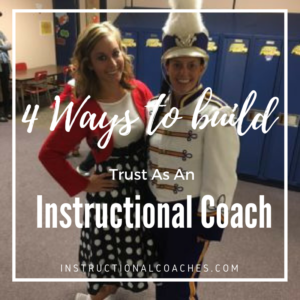3 Ways To Build Trust As An Instructional Coach
Whether you are new to the district or have been there for a while, taking time to build relationships is a must! Even if you feel that you have great relationships with your colleagues. The MOST important steps in starting out as an instructional coach are building relationships and building trust. Trust is a tricky thing to gain. Once lost it is nearly impossible to get back. Without trust, an instructional coach has very little influence over the professional growth of a teacher. This will ultimately affect student achievement. Building trust can seem like a huge undertaking as a new coach, however, trust can mean the difference between your success or failures as a new coach.
Be Available And Open:
One way that I found to build relationships is to be available. Been visible in the hallways, teacher’s lounge, lunchroom, classrooms…… Be available before and after school. Find out when each grade level eats lunch and conduct your “work time” in the teacher’s lounge. Share your schedule with teachers. Check in with teachers. Go to every grade level meeting. Attend every grade level PLC. Please just make sure that you are valuing teacher’s time. Teachers have a lot of things on their plate and a lot to do to get ready for their lessons. Don’t take all of their time to chat. Be there, be visible and available if questions come up.

Listen, Listen, Listen:
Communication is one of the most important factors in building trust. Get teachers talking. Ask them questions and really listen. Talk less and listen more. Get to know the teachers. Share stories, laugh and emphasize. I recently took a class called Cognitive Coaching. It was all about framing questions in order to get teachers to come to their own solution. Paraphrasing is used to help validate what teachers are saying. In this class we had to practice paraphrasing. It was much more difficult than I thought. I realized that I had never REALLY listened to people before. I had heard what they were saying, but never really listened. Does anybody? When you have to summarize someone else’s words it forces you to really listen. Most of the time teachers just want to be heard. They want to feel that someone really cares about their stressors. Sometimes they just need to vent their stress or have someone listen to their successes. People love to be validated and heard. Especially by someone who can relate to their experience. Someone who is in the trenches with them. Of course, in order to build the relationship you also need to let them get to know you. If you are only known as the person that comes into their classroom to see what they are doing they will not be as receptive to you if they would be if an emotional connection was built.

Respect Privacy:
All conversations, even informal conversations need to be kept in confidence. The quickest way to lose a teacher’s trust is to air out their laundry by naming names and passing judgement, especially to their colleagues. If there is something that you talk to a teacher about and think others would benefit from, ask them if you can share it. Teachers are usually pretty willing to share with one another. They also are very grateful for positive recognition. If a teacher doesn’t want something shared, then don’t share it! Show that you are reliable and trustworthy. Do what you say and say what you do. Be transparent by sharing your successes and failures. Share your learnings with others. Just make sure that if you are using an experience as an example to another teacher that you don’t use a name unless that teacher has given you permission! Your job as an instructional coach is not to “spy” on teachers. It is not to “tattle” on teachers. You ARE NOT an administrator. When meeting with your administrator it is important to not name names. This has been the most difficult thing for me as an instructional coach. I really have to stop and think before I speak. I go over what I am going to say in my head and practice not using names. If someone asks me something about another teacher I usually respond using a general statement and keep it positive. Don’t get caught up in or start rumors.
Do The Dirty Work:
In the beginning the best way to get your foot in the door is by sharing the teacher’s workload with them. Teachers want to see that you are willing to help them. Do this by helping them with some of the daunting, time-consuming tasks such as correcting papers, entering data, finding resources, sharing tech tools…… Teachers love anything that will make their lives even a little easier. This actually lends itself to great conversations. I have had organic conversations with teachers about the amount of worksheets/paper work they have. And how we can cut that down and still come out with the same results. The goal of a worksheet is to get students practicing, right? It is also for the teacher to figure out if the student is understanding the skill, right? Well, how can we get the students to practice the same skill without all of this paperwork, and how can we tell if they are learning? This has led into great conversations about formative assessments and bringing the fun back into learning.

